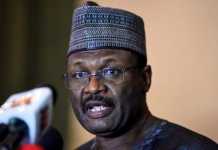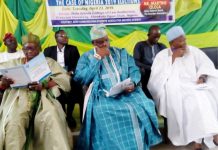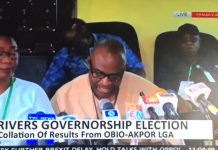In a series of essays in this column entitled “The death of democracy in Nigeria: a coroner’s inquest,” I argued that although democratic governance is not dead yet in the country, it is currently on a ventilator or life support machine such that if appropriate measures are not taken expeditiously by political leaders, it would die. I also insisted that the main reason for that sorry state of affairs is the extremely selfish and wicked disposition of members of the ruling elite, although the gullibility and docility of Nigerians generally manifested by their inability to engage in sustained selfless political activism tend to encourage impunity at all levels of governance.
Without any patina of doubt, the consolidation of responsible democratic system is impossible without a conscious effort by leading intellectuals, civil society groups, labour unions and other interested stakeholders to engage proactively with political office holders and compelling them to be accountable to the people.
Unfortunately, the intellectual class in particular has not done well as a gadfly against the corrupt bulimic ruling cabal through consciousness-raising activities aimed at entrenching democratic culture and values in the society. But what is democratic culture, and what are those values that nourish it?
Like every human institution, the foundation of democratic culture is mental, in this specific instance the recognition and commitment that all citizens of a country who meet the constitutionally prescribed age requirement have the right to aspire to lead or choose those that would lead them in an atmosphere of peace, equality, fairness and justice without discrimination based on irrelevant criteria such as race, ethnicity, religion, gender and socio-economic background. Now, an important caveat on the issue of religion is that adherents of whatever religion must accept the supremacy of the constitution over religious injunctions.
This is where things become really complicated, especially in rudimentary democracies like Nigeria with a sizeable population of Muslims. Because Muslims, as a matter of religious obligation, believe strongly that sharia law with its decidedly anti-democratic provisions, because of its alleged divine origin, is superior to the constitution, Islam cannot provide conducive environment for democracy to thrive.
Thus, one can see why even before independence in 1960 Nigeria has always had to contend with the essential tension between democratic constitutional order and Islamic law, which makes the sustenance of democracy extremely difficult, a situation that was aggravated by the ill-advised implementation of sharia in most states of northern Nigeria.
The way I see it, unless Islam undergoes the kind of intellectual and moral purification that Christianity had undergone since the reformation such that Muslims no longer take certain pronouncements in the Koran and Hadiths as binding on them especially in this era of technology-driven globalisation, the average Muslim would never truly embrace democracy wholeheartedly. As things are presently, democracy and Islam are like water and oil, and it was the zenith of hypocrisy, naivete and hollow political gerrymandering when Prof. Wole Soyinka claimed sometime ago that President Muhammadu Buhari, a devout Muslim and tireless champion of sharia, had become a “converted democrat.” To be candid, and in spite of claims to the contrary about the President by sycophants swimming in the stinking muddy waters of self-deception, there is simply no way anyone can without contradiction be a genuine Muslim and truly embrace democracy in the Lincolnian sense of government of the people, by the people, and for the people.
Democratic culture entails freedom of choice, preference of decisions reached through debate and consensus rather than by imposition or arm-twisting methods, tolerance, willingness to listen to others, commitment to the idea that although decisions by the majority should prevail the minority must be protected, and secularism. From the foregoing, it is clear that democratic culture is nothing other than, and is inseparable from, the ensemble of principles and values that serve as foundation for responsible democratic governance in the hands of those elected through free, fair and credible elections. Because these values are yet to be internalised and made the basis of political praxis by both the political class and the citizens generally, our experiment with democracy remains pathetically underdeveloped, a disfigured version or caricature of real democracy.
Atiku Vs Buhari: Bulkachuwa is wife, mother of APC … , PDP insists
The 2019 general elections are now part of our chequered political history. As is usual with elections in this part of the world, issues of electoral violence, voter suppression, vote buying, rigging and other forms of electoral manipulations reared their ugly heads, such the last elections might turn out to be not only the most litigated since 1960 but also the worst in terms of outcomes that did not reflect the people’s choice. Now, considering that the presidential election is the most important in our political system due to the wide-ranging executive powers conferred by the 1999 constitution on whosoever emerges President, we shall focus primarily on the one held on February 23 as a case study in our appraisal of this year’s elections as a whole, although some interesting issues in other elections would be highlighted as the need arises.
To begin with, the presidential election under scrutiny is unique in several ways. It is the most crowded election for the highest political office in the country. According to available records, seventy-three candidates from the same number of parties vied for the position of President, despite the fact that most Nigerians knew that the real showdown was between the incumbent, President Buhari of the All Progressives Congress (APC), and Alhaji Atiku Abubakar who contested under the main opposition Peoples Democratic Party (PDP) – the remaining seventy-one merely added to the statistics. Again, given the large number of contestants, the logistic problems must have been unprecedented. Indeed, the Independent Electoral Commission (INEC) faced serious challenges in preparing for the election proper, including printing tens of millions of very long unwieldy ballot papers containing necessary information for the dozens of registered parties and ballot boxes for casting the votes.
For millions of voters, the cumbersome ballot papers and hassles during actual balloting made the election tiresome. But because the people were determined to vote, most of them endured the inconveniences with stoic resignation. If we take into consideration the unnecessary stress for both INEC and voters of having so many (mostly unknown ephemeral) political parties, coupled with the prohibitive cost of electoral materials and remuneration for all categories of INEC staff, there is need for drastic review of the current requirements for registering political parties in the country to make the process more stringent and occlude unserious parties formed by political carpetbaggers with frivolous intentions. In my opinion, Nigeria should have just two political parties, and a provision for independent candidacy at all levels of political contestation.
This recommendation would greatly simplify the current sluggish balloting process, save cost and lessen the limitations imposed by agbata ekee political parties on suitably qualified Nigerians who may wish to vie for political offices based on their own merit and capacity to reach out to the electorate independently of political party affiliation. From experience, there is no advantage in having up to ninety-one political parties since most perceptive Nigerians would agree that the June 12 presidential election was largely successful because only two political parties were involved.
Given the large number of political parties that vied for the presidency and the increases in the number of registered voters and logistics by INEC for the polls, it is not surprising that the 2019 general elections are the most expensive to date, which implies that the presidential election is also the costliest. Consider this: INEC’s budget for the 2015 elections was N92.9 billion. This year, the federal government approved a whopping N242 billion for the polls out of which N189 billion went to INEC while N53 billion was shared by security agencies to safeguard the process.
The heavy cost implications of presidential democracy Nigeria copied from the United States has been a contentious issue particularly since the return to civilian administration in 1999. Sadly, lack of creative imagination, greed and plain stupidly prevent the relevant authorities from devising efficient means of reducing the cost of elections. The ugly situation is worsened by the fact that about seventy-five percent of government’s revenue is spent on running the system, leaving less than twenty-five percent for capital projects and debt repayment. Keen observers of Nigerian politics have drawn attention to serious lapses in INEC’s preparation for, and conduct of, the 2019 elections. They argue that despite the billions INEC received from the federal government, there were numerous cases of inadequate electoral materials, and many INEC ad hoc staff complained bitterly about shoddy treatment and unnecessary delays in the payment of their meagre allowances. All this impacted negatively on the quality of the elections.
Kindly contact us @ Naijalivetv@gmail.com
Call or Whatsapp: 07035262029, 07016666694, 08129340000





![Tension in Rivers State As INEC Declaires OBIO-AKPOR LGA ….As Fake Party Agent Accuses Gov. Wike of Kidnaping [FULL VIDEOS]](https://www.naijalivetv.com/wp-content/uploads/2019/04/EB99D35D-F75A-43B2-A877-67ED3DE3073D-218x150.jpeg)



